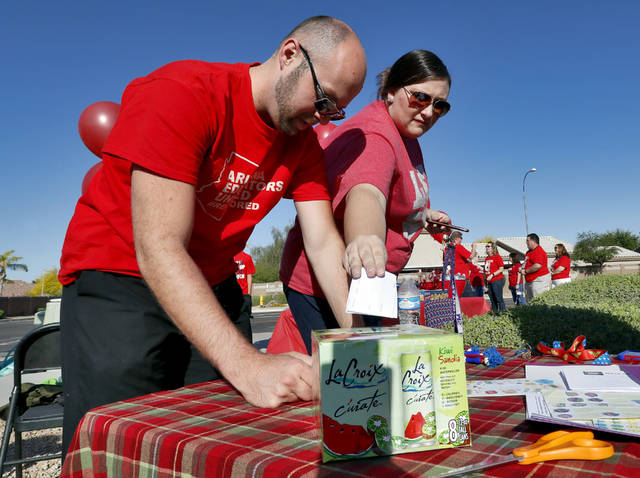PEORIA, Ariz. — The question of whether Arizona teachers should walk off the job to call for increased school funding has both mobilized and stratified tens of thousands of educators, with some saying it’s time for an unprecedented strike aimed at improving the system and others skeptical about shutting down schools.
Teachers were voting Wednesday and into Thursday on a possible walkout, a week after Republican Gov. Doug Ducey offered them a 20 percent raise by 2020. A grass-roots group that organized weeks of protests says his plan doesn’t address other needs, including raises for support staff and a return to pre-Great Recession school funding levels.
Some teachers say enough is enough, and a walkout will show that their mission isn’t just to secure a raise for some of the nation’s lowest-paid educators but to get more money for students. Others are wary of the impact of such a drastic action, including concerns about hourly employees like custodial workers not getting paid.
“We either risk short-term consequences, or we risk long-term consequences,” said Jennifer Ramirez Zamarron, a teacher at Trevor G. Browne High School in Phoenix who supports a walkout.
“I would rather put an effort toward short-term consequences, like, ‘Oh, my kids went without instruction for X amount of days,’ versus ‘My kids went without funding for X amount of years,’” she said.
Jill Coute, a school psychologist in Mesa Public Schools, the state’s largest district, said she was concerned about making up missed days at year’s end and the possibility of a walkout backfiring by upending Ducey’s offer.
She said she thinks teachers are largely supportive of a walkout.
“I’m praying that it’s no, but I have a feeling that it’s going to say yes,” Coute said of the vote results.
Coute, who has otherwise supported teachers’ efforts in the so-called #RedforEd campaign, said the governor was playing “a very good game of chess” by putting forth a proposal that divided educators. She said further action could be taken in the fall when the group has more power behind it.
“I think the parents would rally behind us again,” she said.
The governor’s proposal has drawn support from the business community and some school organizations. But others are concerned about finding the money to cover a plan that would cost about $650 million when fully implemented.
One education advocacy group, Save Our Schools Arizona, said it initially was “cautiously optimistic” but is now worried Ducey’s plan isn’t a “sustainable or comprehensive” way to reinvest in schools.
The governor says money will come from increased state revenue, decreases in social service caseloads and changes in other budget proposals.
Ducey spokesman Daniel Scarpinato said the plan is funded with “the state’s most reliable funding source: the general fund. It’s in the base and will be an ongoing commitment.”
Arizona is one of several Republican-dominant states where teachers have demanded higher pay this year. The movement started in West Virginia, where a strike garnered a raise, and spread to Oklahoma, Kentucky and most recently Colorado.
A statewide walkout would be a first in Arizona and is causing concern about the fallout in this right-to-work state, where unions do not collectively bargain with school districts and representation is not mandatory.
The Arizona Education Association, which supports the grass-roots campaign, has warned its 20,000 members about a 1971 Arizona attorney general opinion saying a statewide strike would be illegal under common law and participants could lose their teaching credentials.
Educators facing the vote are likely scared about the possible consequences, said Lee Adler, a labor professor at Cornell University who has represented unions and their members.
“It’s a critical stage because people have to make a commitment,” he said. “They know how powerful government is in these matters. Everybody realizes that, but many feel like they have no choice because it feels too bad to stay put.
“Others feel bad saying no, but they’re afraid to step out onto the street because they’re afraid somebody might hurt their feet,” Adler said.
Overall, the nationwide movement has taken politicians and labor historians by surprise, he said.
“Nobody expected economic, social and policy injustice fights in right-to-work states,” Adler said.


